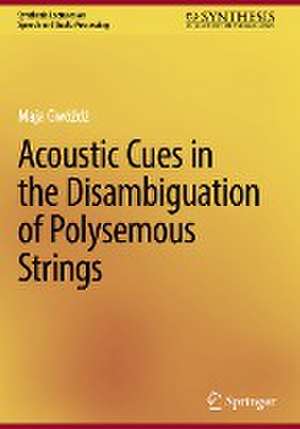Acoustic Cues in the Disambiguation of Polysemous Strings: Synthesis Lectures on Speech and Audio Processing
Autor Maja Gwóźdźen Limba Engleză Hardback – 5 ian 2024
- Analyzes acoustic features of polysemous strings and an implementation of a speech disambiguation program
- Includes evidence that superficially identical strings exhibit different acoustic features
- Argues that acoustic analysis of polysemous phrases can be successfully implemented in automatic speech recognition
Preț: 387.75 lei
Nou
Puncte Express: 582
Preț estimativ în valută:
74.21€ • 77.19$ • 61.26£
74.21€ • 77.19$ • 61.26£
Carte disponibilă
Livrare economică 24 martie-07 aprilie
Preluare comenzi: 021 569.72.76
Specificații
ISBN-13: 9783031466793
ISBN-10: 3031466799
Pagini: 99
Ilustrații: XIV, 99 p. 24 illus., 15 illus. in color.
Dimensiuni: 168 x 240 mm
Greutate: 0.41 kg
Ediția:1st ed. 2024
Editura: Springer Nature Switzerland
Colecția Springer
Seria Synthesis Lectures on Speech and Audio Processing
Locul publicării:Cham, Switzerland
ISBN-10: 3031466799
Pagini: 99
Ilustrații: XIV, 99 p. 24 illus., 15 illus. in color.
Dimensiuni: 168 x 240 mm
Greutate: 0.41 kg
Ediția:1st ed. 2024
Editura: Springer Nature Switzerland
Colecția Springer
Seria Synthesis Lectures on Speech and Audio Processing
Locul publicării:Cham, Switzerland
Cuprins
Introduction.- Ambiguity.- Compounds.- Idioms.- Relative clauses.- Quotations.- Methods.- The experiment.- The software.- Results.- Idioms.- Relative clauses.- Quotations.- The software.- Discussion.- Idioms.- Relative clauses.- Quotations.- The software.- Conclusion.
Notă biografică
Maja Gwozdz studied diverse areas of Linguistics, with a particular interest in logical approaches to semantics, phraseology, and semiotics, before pursuing a graduate degree in Theoretical Computer Science. Her current interests include the (broadly defined) intersection of pure mathematics and computational approaches. She also enjoys analysing the properties of non-standard models of computation and inventing new ones.
Textul de pe ultima copertă
This book provides an analysis of acoustic features of polysemous strings and an implementation of a speech disambiguation program based on the phonetic information. Throughout the book, the term ‘polysemous string’ refers to idioms with plausible literal interpretations, restrictive and non–restrictive relative clauses, and the same expressions used as quotations and appearing in a non–quotational context. The author explains how, typically, context is sufficient to determine the intended meaning. But there is enough evidence in psycholinguistic and phonetic literature to suspect that these superficially identical strings exhibit different acoustic features. In the experiment presented in the book, the participants were asked to read short excerpts containing corresponding elements of polysemous strings placed in the same intonational position. The acoustic analyses of ditropic pairs and subsequent statistical tests revealed that there is almost no difference in the duration, pitch, or intensity in literal and figurative interpretations. However, the analysis of relative clauses and quotations demonstrated that speakers are more likely to use acoustic cues to differentiate between the two possible readings. The book argues that the acoustic analysis of polysemous phrases could be successfully implemented in designing automatic speech recognition systems in order to improve their performance in disambiguating polysemous phrases.
- Analyzes acoustic features of polysemous strings and an implementation of a speech disambiguation program
- Includes evidence that superficially identical strings exhibit different acoustic features
- Argues that acoustic analysis of polysemous phrases can be successfully implemented in automatic speech recognition
Caracteristici
Analyzes acoustic features of polysemous strings and an implementation of a speech disambiguation program Includes evidence that superficially identical strings exhibit different acoustic features Argues that acoustic analysis of polysemous phrases can be successfully implemented in automatic speech recognition













